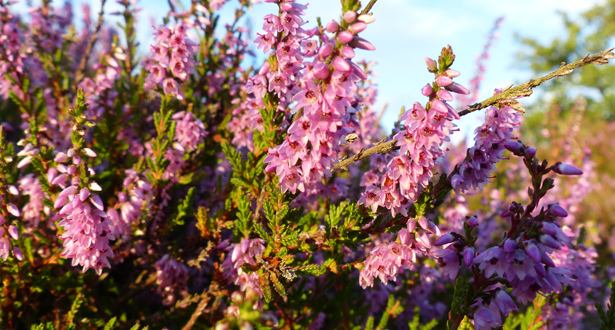Heather, juniper & Co.
Many rare plants grow in Lüneburg Heath Nature Park. Particularly characteristic are common heather and cross-leaved heath as well as juniper.
Common heather – it loves acidic soil
Common heather is also known in English as ‘ling’ or simply ‘heather’. Its generic name "Calluna vulgaris" derives from the Greek word kallyno, meaning "beautify, sweep clean". Its German name reflects this – besen is brush in English. Common heather defines the landscape in Lüneburg Heath Nature Reserve. It is an evergreen dwarf shrub with light violet flowers, with an up to 15 cm long, one-sided, dense raceme. The nodding flowers are about 4 mm long.
Common heather loves sunny and light places and is found on heathland, unimproved meadows, dry forests, moorland and on rocky ground. It is regarded as acid-loving, i.e. a plant which can only thrive on soils with a specific pH value. The soils must be acidic or nutrient- and base-poor for common heather.
Cross-leaved heath - a heather that prefers more moisture
The preferred habitats of cross-leaved heath are wet heathlands, meadows, heather moorland, scrub and bog woodland. Cross-leaved heath prefers a bit more moisture. Because of land drainage, it has become more endangered.
Like common heather, cross-leaved heath prefers low-nutrient sites. Cross-leaved heath is an evergreen dwarf shrub, which reaches a height of 15 to 50 cm. The inflorescence has a compact cluster of five to fifteen individual flowers. The flowers are 6 to 9 mm long, pink, bell-shaped and dropping.
Juniper - a prickly contemporary, with the best of intentions
Like all evergreen cypress trees, juniper loves the light and warmth of the sun. The open landscapes are thus a good habitat. Juniper can have many forms, from a narrow, metre-high column to a low or flat spreading shrub.
Although at first the juniper seems to stand rather alone in the landscape, it does also think about others. It provides many birds with shelter and food. It is also a habitat for insects. Bees benefit from the pollen of the male cones. It provides protection against browsing for other plants and trees. Its sharp needles hold off the Heidschnucken (German grey heath), wild boar and grazing livestock. Since the Middle Ages people have used its blue-black berries as a botanical remedy. They have a strong dehydration effect and are used in many diet and detoxification teas. Its "berries" are also used to flavour gin.
But ingratitude is the world's wage. If the juniper is unlucky, the tree that it has protected over the years will out-grow it, taking away the light and warmth of the sun which it desperately needs for life. Man has also reduced its habitat so that the juniper is on the Red List in Germany.

![[Translate to Englisch:] Siegel: Europäische Union – Europäischer Fond für regionale Entwicklung.](/fileadmin/_processed_/d/6/csm_europaeische-union-fond-regionale-entwicklung-logo_50eda43563.gif)
![[Translate to Englisch:] Logo Europa für Niedersachsen.](/fileadmin/_processed_/b/e/csm_europa-fuer-niedersachsen-logo_7b3947c73c.gif)
![[Translate to Englisch:] Logo Leader.](/fileadmin/_processed_/c/5/csm_leader-logo_c9a57e9ee0.gif)
![[Translate to Englisch:] Siegel: Europäische Union – Europäischer Landwirtschaftsfond für die Entwicklung des ländlichen Raums.](/fileadmin/_processed_/4/7/csm_europaeischer-landwirtschaftsfond-logo_ce24e54bf4.gif)
![[Translate to Englisch:] Logo touristischer Partner Lüneburger Heide.](/fileadmin/_processed_/4/3/csm_lueneburgerheide_positiv-mit-schatten_logo_00411b91a8.gif)